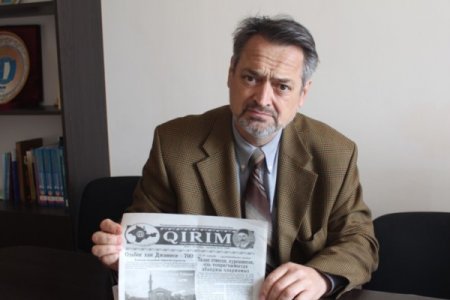
68-year-old Bekir Mamutov, Chief Editor of the Crimean Tatar language newspaper Qirim, and the newspaper itself, are facing absurd charges of ‘discrediting’ Russia’s armed forces and of circulating ‘false information’. The second charge is over publication of information about an entirely accurate United Nations report on Russia’s use of torture.
The charges were initiated by V. Koreninksy from Russia’s notorious ‘Centre for countering extremism’. Occupation ‘police’ turned up early on 17 May and carried out searches at the homes of Bekir Mamutov and of the founder of Qirim, 59-year-old Seiran Ibragimov, as well as at the Qirum editorial office.
Two protocols on administrative charges were drawn up, both against Mamutov himself, and against Qirim. The first of these is under Article 20.3.3 of Russia’s Code of administrative offences, one of four repressive criminal and administrative charges rushed into Russian legislation within ten days of Russia’s full-scale invasion of Ukraine. It is claimed that Mamutov, through one of his articles, “circulated information aimed at discrediting the use of the Russian Federation’s armed forces to defend the interests of the Russian Federation and its citizens, to support international peace and security as part of the demilitarization and denazification of Ukraine”. In short, Mamutov is charged with not supporting Russia’s war of aggression against Ukraine, what it euphemistically calls its ‘special military operation’. Mamutov’s article explained why Crimeans should not take part in this supposed ‘special operation’ on Ukrainian territory.
The second charge is under Article 13.15 of the same code and refers to something termed ‘abuse of freedom of mass information’. The prosecution is, quite literally, over Mamutov’s publication in Qirim of an excerpt from a United Nations report on the human rights situation in occupied Crimea. The excerpt was about Russia’s unwarranted detentions and beating of people on occupied territory, and cited the torture of a Crimean Tatar in Kherson (while under Russian occupation) and the harsh conditions of SIZO No. 2, one of the remand prisons which Russia has opened in Crimea since its full-scale invasion of Ukraine. The claim is that this article “circulated inaccurate information under the guise of facts, which posed the danger of harm to the life and health of citizens, property, the threat of mass infringement of public order and public safety”.
In trying to justify this second charge, the ‘Centre’ claimed that since 2017 up till the present day, the Russian occupation ‘police’ have received no information about the use of torture and ill treatment, and the SIZO No. 2 administration assert that the conditions “fully comply with the requirements of Russian legislation.”
These are two of Russia’s arsenal of repressive norms used against those who express pro-Ukrainian views, oppose its aggression against Ukraine, etc. Despite the absurdity of the charges, convictions are virtually inevitable.
In Bekir Mamutov’s case, this is the second time that he has been prosecuted for publishing entirely truthful information from a UN Monitoring Mission report on occupied Crimea. In April 2021, he was also charged, under Article 13.15, with ‘abuse of freedom of mass information’ over publication of a UN report which mentioned the Mejlis, or self-governing body, of the Crimean Tatar people. Russia’s ban of this internationally recognized representative of the main indigenous people of Crimea in 2016 received international condemnation yet has remained in force to this day. The excuse for the prosecution on that occasion was not the (clearly correct) content of the report, but the fact that Mamutov and the newspaper had not added words to the quote by mentioning that Russia has banned the Mejlis as ‘an extremist organization’. A Russian-controlled ‘magistrate’s court’ found Mamutov guilty as charged and imposed a four-thousand rouble fine.



